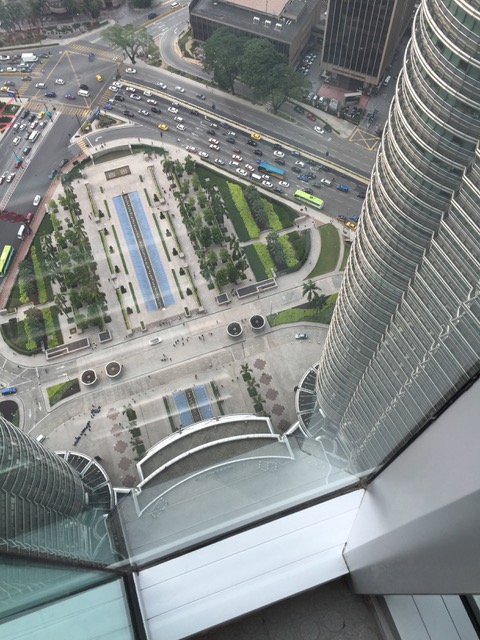By Joyce Eisenberg
When I tell friends where I’m headed for my next vacation, they tell me how exciting my trip sounds. Then they invariably ask if it’s really safe to go there. Sometimes they simply tell me I shouldn’t go:
‘You’re going to Krakow? Poland is anti-Semitic.’
‘Is Costa Rica safe? I read there was a kidnapping there.’
‘You can’t go to Bali. They just had an earthquake.’
The scariest thing in Kuala Lumpur, Malaysia, was the view from the skybridge on the 82nd floor of the Petronas Twin Towers.
Trips to Israel, Malaysia, France, Morocco and Colombia also elicited travel warnings from friends. Each time I listened, and every time I went anyway because I had already considered the pros and cons. I have never regretted my choice, and it has reinforced what I believe: You should look beyond the headlines, stereotypes and warnings; read the State Department warnings; ask your travel planner for advice; and make an informed decision.
In 2010 my son, Ben, announced that he was going to North Korea. I wasn’t worried, but friends and family members were. “How can you let him go?” they asked. How could I stop him? Ben was 25 and had been traveling the world since he was 8.
He was going with Koryo Tours, a British-run, Beijing-based company that had taken thousands of people to North Korea since 1993. I didn’t want to stop him. I trusted his judgment and the tour company – and it sounded like a great adventure. In fact, four years earlier, Ben and I had signed up for a trip to North Korea run by the World Affairs Council of Philadelphia. We were disappointed when it was cancelled because of flooding in the capital.
Some destinations are unsafe for travelers at certain times (U.S. citizens are not allowed to travel to North Korea currently), but I believe the world is safer than you think. Here are some things to consider:
Don’t judge a country by its government.
Earlier this year, Poland’s right-wing government passed a law making it criminal for people to publicly imply Poles’ involvement in Nazi crimes against Jews. So while this government action was anti-Semitic, it didn’t reflect the views of the majority of the country’s citizens. The government backed down. When my husband and I visited and toured both the former Jewish ghetto of Krakow and the Wawel Cathedral, we felt safe and welcome.
Know your geography.
It’s easy to worry when you aren’t sure about a country’s size or precise location. Ben’s Travel Service helped a newlywed couple plan a trip to Bali for their honeymoon. When I heard about the recent earthquake and tsunami that struck Sulawesi, I knew that both places were in Indonesia, and I was concerned. When I checked Google Maps, I saw they were about 1,000 miles apart, roughly the distance from Philadelphia to Des Moines, Iowa.
I’m planning a trip to Ethiopia next year. I read that there are travel warnings for the border areas with Kenya and Eritrea, but I also learned that Ethiopia is 10 times the size of Pennsylvania, and Addis Ababa and the main tourist sites are in the middle of the country. Travel there is considered safe.
Keep crime statistics in perspective.
Before we left for a trip to Costa Rica, a friend we were travelling with asked if we should cancel. She had seen a story in The New York Times about a kidnapping in the capital. The story made the news because it was such a rare occurrence, and I told her that if she compared that to the crime statistics in New York City (where she went regularly) she’d never go to New York again.
Remember that times and countries change
Danger in Morocco? Only a kissing camel . . .
Have you gone to a high school reunion and discovered that the annoying kid you stayed away from in 9th grade grew up and is a now a great guy? Countries are like that, too. The Rwandan genocide is history. According to a 2018 New York Times article, “More than 20 years after the horrific genocide, Kigali (the capital) is a proud city, known for its start-ups, energetic art scene and great dining and coffee.”
. . . and a charming snake.



